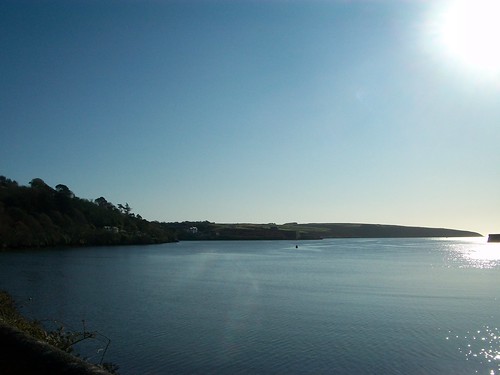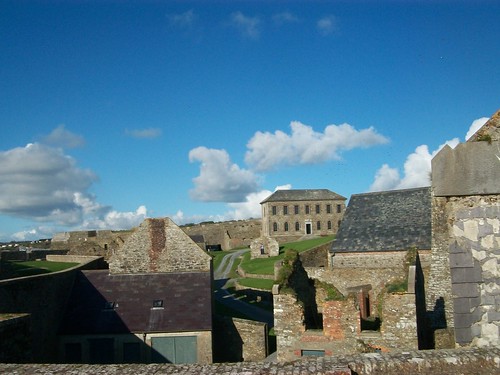Last weekend my kind sister and parents minded the children while Mr. Waffle and I skipped off to Kinsale. As a former local, I’ve never really been a tourist in this part of the world before. It’s lovely, I can tell you.
We stayed in a place called the Glebe House [query for Protestants – what’s the difference between a Glebe, a Vicarage, a Rectory and a Manse?] and it was delightful – roaring fires; Victorian furniture; pleasant views; and a charming hostess.
On Saturday morning we took the Scilly walk out to Charles Fort.
I had, to my intense chagrin, left my heritage card in the car but the nice woman from the OPW looked in her book and found the entry showing where my sister had bought the card [a present] and let us in free. €8 saved – hurrah [insert your own cliché about the recession here]. Charles Fort has been tarted up enormously since I last visited – probably about 20 years ago – and it looked very cared for. The OPW staff gave an interesting tour and were very knowledgeable about the site. The sun was shining; the weather was beautiful could it get any better?
Oh yes, it could. A local collective was having a sale of crafty things; including expensive, but very delicate and beautiful batik pictures. I bought Christmas tree ornaments and soap from the lady who makes it. She was cutting her own ribbons while I was talking to her – the handmade clearly covers all angles. And then we went for late lunch in here; a restaurant I have been curious about for some time. It was nice and very, very busy – still heaving at 4 when we left but not as spectacular as local opinion had led me to believe. Then we went our separate ways for a bit. I got to go around the town which is pretty, though familiar, and particularly rich in what Mr. Waffle disparagingly calls “upmarket tourist tat”. In a sweet shop, there was a young man leaning on the counter speaking to the young woman who was serving in a strong local rural accent. “I was up fixing your father’s rooter last night,” he said. “What kind of agricultural implement is that?” I wondered to myself. Then the young man added, “He’s delighted with the new netbook, isn’t he?” Ah, that kind of router. My favourite shop is Kinsale Silver where I almost always find something but there are lots of great, small, appealing shops and, if only I were a little more organised, my Christmas shopping would now be complete.
On Sunday before being reunited with our children we went for a walk on Garretstown beach and it was so warm that we had to take off our coats. I think we must have got one of the best weekends of the year. As we hopped into the car, I called my sister to tell her that we were on our way, “Will you be glad to see us?” I asked the babysitter in chief. She considered for a moment, “I’ll be glad to see you leave,” she offered. It’s a good job that we had such a wonderful time because I can’t see our babysitter in chief being ready to take on another weekend of sunshine and laughter with small children immediately.


A rectory is a place a rector lives in and a vicarage is a place a vicar lives in. The difference between a rector and a vicar has to do with the extent to which they are entitled to the tithes of the parish: a rector has more rights over the living than a vicar (I can’t remember the exact details off the top of my head. But in theory a vicar is a kind of deputy or subsitute – this is why the Pope is the Vicar of Christ on Earth. Only not, from an Anglican point of view). Non-conformist ministers have manses. A glebe – sorry, at this point I have to sacrifice pride and get help from wikipedia, though my instinct is that it’s a piece of land that bring income to the rector: “In the Roman Catholic and Anglican church traditions, a glebe was an area of land belonging to a benefice. This was property (in addition to the parsonage house and grounds) which was assigned to support the priest. Glebe included a wide variety of properties including strips in the open field system or could be grouped together into a compact plot of land. Tithes were in early times the main means of support for the parish clergy but glebe land was either granted by the lord of the manor of the manor in which the church was situated, often with co-terminous boundaries as the parish, or accumulated from other donations of particular pieces of land and was rarely sold.” There, I was right (if not very detailed). Hooray for me.
More help from wikipedia: in the Anglican Church, rectors traditionally received both the Greater and Lesser Tithes, but vicars just the lesser, with the great tithes going to the holder or proprietor of the living. In the modern church the distinction of title is usually to do with the history of the parish. These days both vicars and rectors are paid a salary; they get a house as well, but their incomes are small.
A glebe is a Chinese grebe (sorry). It’s also where Lucia lives, later Mapp.
afaik Manses are only found in Scotland, and I think only for Church of Scotland ministers. My parents used to live in an ex Manse, called the Old Manse, with the new Manse then being called the Manse or the New Manse, until it too was sold off to presumably become the New Old Manse.
Aren’t you all very knowledgeable? Dot, gets prize though…